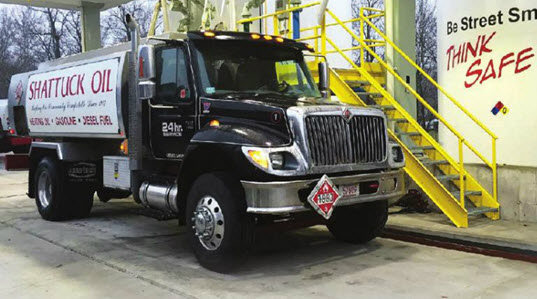Bulking Up
Lindell Fuels built a new bulk plant that opened at the beginning of this year. It includes a 153,000-gallon fuel oil tank, and four smaller storage tanks for kerosene, diesel and two different grades of gasoline.
‘You can’t do this for one million dollars,” said Russell Riva, the head of the family owned enterprise that includes Lindell Fuels, HVAC contracting and services, a True Value hardware store, a drive-through lumber warehouse and a feed business, in Canaan, a tiny community tucked into the rural northwestern corner of Connecticut.
The new bulk plant replaced two 20,000-gallon, above-ground storage tanks that were surrounded by berms and would have been out of compliance with the Environmental Protection Agency’s spill prevention control and countermeasure (SPCC) rule, said Buddy Riva, general manager of Lindell Fuels. The spill prevention rule is scheduled to become effective on November 10.
‘The [options were] build this or get out of the business, probably,” Buddy Riva said.
Northeastern Petroleum Service & Supply, Jamaica Plain, Mass., and H.M. Riggle Welding & Piping, Wareham, Mass., were contractors on the project.
‘There was nobody in Connecticut who would or could do it,” Buddy Riva said.
At the same time, because the family-owned enterprises include the lumber warehouse, HVAC installation and servicing, the hardware store and all the background and experience that go with those activities, Lindell Fuels was able to bring expertise that made it an unusually helpful customer, functioning in some ways like a general contractor for the project, said Jerry Mello of Northeastern Petroleum and Harry Riggle, the welding and piping contractor. For instance, the pumps and pipes and other components could be stored in the lumber warehouse, a couple of hundred yards or so from the site where the bulk plant was being erected.
Lindell Fuels broke ground on the three-acre site, on an undeveloped section of its property, in April 2009, and the excavating and installing of underground drainage pipes was done over that summer. Construction of the bulk plant itself began in mid October and took about 12 weeks, with the plant becoming operational at the beginning of 2010.
The largest tank, for fuel oil, was made on the site by Pittsburgh Tank & Tower Co. The company, which, contrary to its name, is based in Henderson, Ky., company specializes in field-erected storage tanks. The parts of the tank were trucked to Canaan and the pieces welded together by a crew sent from Kentucky by Pittsburgh Tank & Tower.
The smaller tanks were made by Highland Tank & Manufacturing Co., and trucked complete to the site. The three with a capacity of 10,000 gallons were made at a plant in Watervliet, N.Y, and transported by Allyndale Limestone Corp., which is based in Canaan. (Riggle, the welding and piping contractor, noted that the tanks constitute oversized loads, and so are subject to regulations that require they be transported in daylight and during non-peak traffic times.)
Equipment installed in the Lindell Fuels plant includes Gorman-Rupp Co.’s Roto-Prime Pump and Omntec Manufacturing Inc.’s product gauging and monitoring systems.
The bulk plant includes a 500-gallon tank that holds Greenburn, an additive designed to prevent water and sludge buildup in fuel oil, promote efficient combustion and preserve mechanical components of home heating systems. Manufactured by Afton Chemical Corp., it is supplied to Lindell Fuels by Advanced Fuel Solutions, North Reading, Mass. The 500 gallons of Greenburn cost $14,000, Buddy Riva said. The mixing ratio is two gallons of the additive per 7,500 gallons of fuel oil.
As a fueling facility subject to safety and environmental regulations, the bulk plant incorporates a range of stipulated devices and components. For instance ‘explosion-proof” electrical outlets are placed at a number of locations on the concrete containment wall.
Within 50 yards or so of the bulk plant are two 30,000-gallon propane tanks enclosed by a fence. A propane-powered generator, fueled from one of the tanks, can provide backup, so that the bulk plant can continue operating in the event of a power cut.
Lindell Fuels operates four fuel oil trucks, as well as two others for propane, one for gasoline and one for diesel fuel. Fred Bushnell, the head mechanic, and another full-time mechanic maintain the vehicles.
Although the Rivas did not want to reveal the total investment in the bulk plant, Russell Riva did highlight amounts that were spent on certain aspects of the project. For instance, he said the cost of site preparation amounted to $160,000, in part because the site is on a 100-year flood plain. That means a certain level of flood water is expected to be equaled or exceeded at the location every 100 years, on average. The expected flood water level is used as a reference in the granting of building permits, and in the application of environmental regulations. A reason for the extensive and expensive site work at the Lindell Fuels location was that fill had to be added so that the plant would sit at a higher level.
In some respects, Russell and Buddy Riva said, the family owned company went beyond requirements or accepted minimal standards. For example, the concrete aprons in loading bays like those at the plant are typically 12 inches thick, but at the Lindell bulk plant they are about 30 inches thick, in order, the Rivas said, to better withstand the weight of the trucks passing over them.
Likewise, the roofs ‘ one over the storage tanks, one over the loading bays ‘ are insulated, a point that Russell Riva insisted on, said Buddy Riva, who in addition to serving as general manager of Lindell Fuels is Russell’s nephew. ‘It was an expense,” Buddy Riva said, ‘but my uncle said, ‘You’re not putting it up without that.'” The insulation prevents condensation from forming on the underside of the roofs and dripping on the tanks, pipes, pumps and people below.
###
The big picture
When it comes to building or upgrading a bulk plant, consider the big picture, equipment suppliers advised.
Mike Trask of Hall Trask Equipment Co. in Braintree, Mass., and Trask Petroleum Equipment Co. in Providence, R.I., said that when dealers upgrade a loading area by adding overfill protection or redesigning a pumping system, the goal should be to increase flexibility ‘ the ability to off-load and load a variety of products with as few pumps as possible.
Operators also need to adapt their facilities to dovetail with their business plans. ‘It’s not just about piping and pumping,” Trask said. This often means investing in technology that provides automated monitoring and fuel management, Trask said. Software that can generate a bill of lading for throughput customers, for example, can drive efficiency gains, he said.
The federal SPCC rule pushed many bulk plant operators to update their facilities ‘ or close them. Regulations by states can have a big effect too. In Wisconsin, for example, the state’s Department of Commerce, which oversees such facilities, is requiring visual and audible overfill alarms, said Woody Garrow, a co-owner and partner in Great Lakes Tank Systems, Appleton, Wis. Garrow spoke on the phone during a break from a state-sponsored class on the new requirement. He said the rule was generating business for his business.
Being a physical asset, a bulk plant needs regular inspection and maintenance, Brian Savage, president of Savage Associates, Watchung, N.J., said. That means allocating dollars for those in the budget. Walking around a facility and making notes in the SPCC log of one or two items that need attention is recommended, Savage said. Further, if large volume is flowing through a meter, the result can be wear; the meter should be calibrated every six months, Savage said, ‘or else you’re giving away product.”
Gabe Frezzo, president of Liquid Measurement & Controls, Collegeville, Pa., a supplier of bulk plant equipment including hardware for throughput automation said that not many new bulk plants are being built currently, but he added, ‘If you do have a bulk plant far enough away from a major petroleum terminal it can be quite valuable.” The Lindell Fuels facility fits that profile, being in a rather remote location and offering opportunities for throughput, Frezzo and other industry veterans said.



